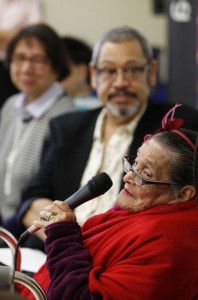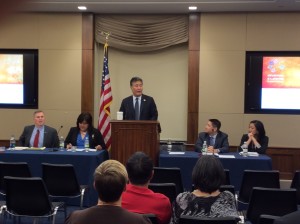The 2015 White House Conference on Aging (WHCOA) took place this past Monday, and as the dust settles, we get the opportunity to take stock of the events on July 13th as well as the events leading up to the day. For the Diverse Elders Coalition, this week is the culmination of months of work including engagement with local partners, extensive policy analysis, and working directly with the White House Conference on Aging and other policymakers. With clear goals of articulating the experiences of elders of color, American Indian/Alaska Native elders, and LGBT elders, and identifying specific policy recommendations, the DEC, its member organizations, and their constituents came to Washington, DC with a firm sense of purpose. The report we issued this week provides a comprehensive summary of this work and represents a road map of how we brought the voices of diverse elders to “A Seat at the Table.” While we made our case loud and clear in a number of venues and formats, time will tell whether the impact we’ve made this week will result in long-standing and concrete improvements in the communities we serve.

Participants at our Diverse Voices Town Hall forum in Los Angeles on May 7th.
Starting as early as September of last year, we began a journey with the White House Conference on Aging that took us all across the country, from Washington, DC to Washington state. Working with White House Conference on Aging Executive Director Nora Super and Administrator Kathy Greenlee from the Administration for Community Living, the DEC followed a path across the five Regional Forums the White House Conference on Aging hosted throughout the Winter and Spring to the White House on July 13th.
That Monday morning, all five principals of our DEC member organizations showed up at the White House bright and early while our DEC staff joined one of the more than 600 watch parties organized to live stream the event, many of which were organized by DEC member organizations. At the watch party we attended, co-hosted by our friends at the National Caucus and Center on Black Aging and Compassion and Choices, we witnessed the history unfolding before us. Colleagues and friends such as Ai-Jen Poo from the National Domestic Workers Alliance and the Caring Across Generations Campaign spoke about the need to include the voices of diverse elders, and Secretary of Health and Human Services Sylvia Burwell mentioned our coalition by name when talking about the WHCOA’s work to engage communities. Some new policy initiatives, such as a commitment to facilitate state supported retirement plans, were announced, but a key policy change supported by the coalition was particularly welcomed. The Department of Housing and Urban Development announced it will take action to eliminate discrimination against LGBT elders in senior housing, addressing a key need put forth by DEC partner SAGE. The evening reception SAGE hosted that night celebrated that policy victory and provided an opportunity to welcome DEC partners and other friends and colleagues to Washington.
The following morning, the entire DEC team arrived on Capitol Hill to hold a Congressional Briefing on Diverse Elders and the White House Conference on Aging. Rep. Mark Takano (D-CA), an LGBT Asian American Congressman representing a district that is predominantly Latino, was the perfect member of Congress to join our Briefing. We were also joined and supported by the Congressional Asian Pacific American Caucus. Rep. Takano’s personal words of support and his commitment to the policies and the values of the Diverse Elders Coalition helped set the right tone for the panel of DEC member organizations that followed. One by one, our panelists shared what it meant for them to be part of that moment, their policy analysis and recommendations, and what they thought next steps should be. The audience, which was made up of Congressional staffers, policy advocates in Washington, DC, and elders from the community as far away as Oregon, took part in an important conversation on behalf of all our elders.

Ben de Guzman introduces the EDs of the Diverse Elders Coalition member organizations at our Congressional Briefing on July 14th.
Meeting later in the day, our coalition had important conversations about our work to date and new commitments moving forward. At the Briefing, I thanked our coalition member organizations for their passion and compassion, which will be more important than ever as we continue to bring the voices of our diverse elders to the table for the next ten years and beyond.
The opinions expressed in this article are those of the author and do not necessarily reflect those of the Diverse Elders Coalition.


